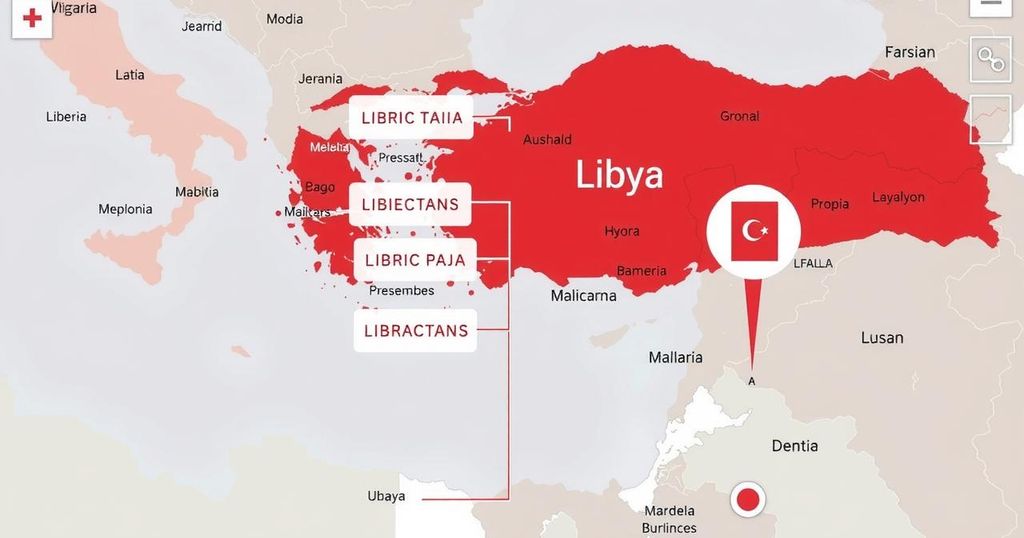Emerging Geopolitical Dynamics in the Mediterranean: Assad’s Fall and Its Impact on Libya
The ousting of Bashar al-Assad in Syria has prompted Russia to strengthen ties with Khalifa Haftar in Libya, increasing military movement and strategic focus in the region. This reshuffle raises alarms in Western capitals about Russia’s growing influence. The intertwined fates of Syria and Libya illustrate the geopolitical complexities in the Mediterranean, highlighting the risks of escalating conflicts and external power dynamics.
The recent ousting of Bashar al-Assad in Syria has initiated a significant geopolitical shift, with implications reaching as far as Libya. Following Assad’s departure, reports surfaced of Syrian officials landing in Libya’s Benghazi, signaling a potential strengthening of ties between Assad’s regime and Khalifa Haftar’s forces in Libya. The loss of military assets in Syria has led Russia to redirect its focus toward Libya, increasing air traffic and naval movements in the region.
As Moscow attempts to manage its military resources amidst the turmoil in Syria, it is reportedly increasing its support for Haftar. With Russian naval assets positioning themselves in the Mediterranean, the potential for expanded Russian influence in Libya raises alarms among Western officials. Despite ongoing concerns, the United States and its allies have yet to implement effective countermeasures against Russia’s infiltration in the region.
Russia’s long-standing naval facility in Tartus, Syria, has been a strategic asset, but with Assad’s regime weakened, Kremlin strategies are shifting towards securing a stronger presence in Libya. Analysts emphasize that Haftar’s position appears strengthened as he recognizes the dependency of Russia on Libyan resources.
Khalifa Haftar, a former officer in Muammar Gaddafi’s army and now a formidable military leader in Libya, has cultivated relationships similar to those of Assad. The interplay between their regimes illustrates a shared reliance on authoritarian practices and military support. Investigations into illicit trafficking networks have linked the Haftars and Assads, revealing a complex web of mutual benefit and political alliance.
With the backdrop of Turkey’s involvement in Libya to support the Tripoli government, new dynamics have emerged as both Turkey and Russia establish their foothold in the region. The geopolitical landscape remains fluid as both powers navigate their strategic interests in the context of Libya’s resources and ongoing conflicts in neighboring regions. As Russian and Turkish influences expand, analysts caution that the outcome of these developments could have broad consequences for stability across North Africa and the Sahel.
In summary, the fallout from Assad’s ousting is reshaping the Mediterranean landscape, as Russia positions itself to strengthen ties with Khalifa Haftar, indicating a new chapter in the region’s complex dynamics.
The political upheaval in Syria, marked by the removal of President Bashar al-Assad, has triggered a cascade of strategic recalibrations, particularly affecting Russia’s military interests in the Mediterranean. Historically, Russia has utilized its naval base in Tartus, Syria, as a critical point for regional operations. As Assad’s regime has weakened, Russia faces challenges in maintaining its military influence in the region, prompting a pivot towards Libya. This transition highlights the interconnectedness of conflicts in the Mediterranean and North Africa, where the actions of one state can significantly impact the political climate in neighboring regions. Khalifa Haftar’s rise in eastern Libya, aligned with Russian interests, presents further complications as external powers navigate their stake in the ongoing disputes and alliances forged in this tumultuous setting.
The recent developments following the ouster of Bashar al-Assad indicate a significant shift in the geopolitical framework of the Mediterranean, particularly concerning Russia’s renewed focus on Libya. The strengthening of Khalifa Haftar’s position, fueled by Russian support, poses challenges to Western powers, who have yet to effectively respond to the growing Russian influence in the region. As alliances form and conflicts intersect, the stability of Libya and neighboring areas hangs in the balance. The evolving situation underscores the need for a comprehensive understanding of these interconnected conflicts and the broader implications for security and power dynamics in North Africa.
Original Source: www.france24.com




Post Comment